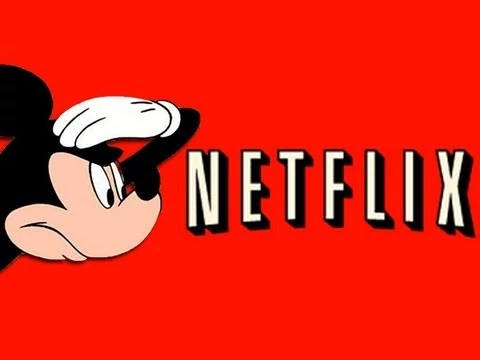Netflix changed TV and Film in the past decade. No one will deny this.
It has been disruptive to the way that Movies and Television are paid for and watched, and more importantly how is consumed.

But now Netflix is being attacked from all sides. It’s in the sights of some really big players that don’t want to licence their content through the streaming giant. Companies such as Apple,Google, Amazon and Disney are setting their sites on Netflix. The question is “Can they survive this new wave of competition?”.
To understand the struggle Netflix faces, it’s important to take a look back at thier short history.
In the 90’s movie rental stores were big buisness. You would rent your movie overnight and return it in 24-48 hours. Any movies returned after this time would incur ‘Late Fee’s’. Returning movies late could become very costly.
Netflix’s business was different. It let users effectively buy a number of DVD’s and swap them for new titles by using the postal service . Netflix monetised this by charging a monthly fee creating a video club.
When Netflix launched its streaming service, Its content was poor, consisting of old movies, and vintage TV shows. It was a small offering which served as a supplementary offering to their Postal service.
While this was happening, the music industry had just gone through its biggest transformation since the advent of radio. The internet had made piracy rife, but apples iTunes service managed to corner the market of selling digital music online. Subscription streaming later became popular, as services such as Spotify became the standard way to consume music.

Piracy of movies was starting to boom, and Netflix looked like a win win for movie studios and TV companies. Netflix is credited for cutting video piracy in half, while creating a second source of revenue for content makers.As subscriber numbers grew, so did the library that Netflix could subcontract from the major studios. They decided to keep the monthly charge cheap in order to grow customers, and it worked. The only problem was that Netflix relied on other companies to licence out content. Should this stop, they would be in trouble.
This was clearly not ignored by the management. They knew that they needed their own content before licensing deals with content owners were to be renegotiated. The rate in which Netflix grew its catalogue is astounding. The quality of the productions heralded a golden era of content. Netflix was getting a name for both quality productions and prolific creation. But not all the growth was good. in the race to build a library, a lot of low budget movies brought direclty to Netflix bypassing the cinema. While this looked like a short term win, it meant a lot of studios ‘dumping’ their turkeys on the service in order to avoid losses at the box office. This has resulted in the service hosting some expensive flops.
However, it was always clear that the day would come when Netflix would have to pay huge tariffs to keep hold of its 3rd party content.
The massive library of Netflix originals was a hit, but had been binged by subscribers that became more and more demanding of their service.
Content owners were looking to Netflix’s massive growth, and no doubt questions were being asked in boardrooms around the globe. The business model of selling streaming subscription’s had worked and maybe it was time to compete.
This brings us to where we are today. Netflix is about to loose all of its content from all Disney owned companies such as PIXAR,MARVEL and FOX. Leaving them with their own franchaies such as ’Stranger Things’, and ‘Bojack Horsersman’. Not only have they lost Disney as content providers, they have also lost them as popular content makers. Disney are responsible for a large number of popular Netflix shows that have now been canceled.
It’s looking increasingly as though Netflix has been outplayed by older/richer, companies. I see it as a boxing match where, the likes of DIsney allow their opponent to waste all of their energy bouncing around before they lay the fast fatal blow.
But Netflix’s problems do not stop there. If we look back to the example of the music streaming industry, Spotify has continued to be strong despite overwhelming competition for Apple/ Amazon/ Tidal. Music piracy is complely dead, and looks to remain that way for now. The reason this works is because Spotify operates on a level playing filed with its competitors. If a user subscribes to any music site, they can listen to the same music. Exclusives are not really a big thing in music streaming.
Because of this, music streaming services are a very attractive alterative value proposition to the consumer. The single fee gives access to all thier music, and the only point of difference is the interface, price or platform it is streamed on. Piracy is not the most convenient way to listen to music.
However, with the vast amount of video streaming services are cluttering the market. Users are being asked to sign up to an increasingly high number of platforms. Each has their own login details exclusive content and interfaces. Piracy is once again on the increase for video content, and i would argue that this is a primary reason. Where we once had one hub for all of our content, it is becoming an expensive mess.

The goose that lays the golden egg is being killed by the confusing infrastructure that is being built by all of these services.
Netflix has its final problem in the way that people consume video content. It is not the same as music. The same music is listened to repeatedly, but subscribers don’t often watch the same shows many times. Keeping a constant flow of video content is a diffcult business to be in. Video content dates a lot more than music, and back catalogues of TV become increasingly irrelevant. The shows that have stood the test of time such as ‘friends’ are not cheap too licence.
I think Netflix has played a fantastic game. They were aware of the oncoming crisis of content and have taken some steps that very much ‘keep it in the game’. But viewer numbers will drop, and prices will put off new subscribers as many decided they don’t uses the service enough anymore.
I personally have looked at the shows I’ve watched on Netflix this month, and its been negligible. This is not because they have bad content, but because ive viewed most things that interest me. As the price rises come in, and rival services offer vast new libraries of content at bargain prices, it will hurt the company. Until i read about the recent price increases I didn’t even notice the cost of Netflix, but a 30% increase has made me look at the service again. I would expect further price increases in the future, and that’s dangerous.
I would not be surprised to see Netflix finding a partner with a big back catalogue of classic shows and franchises in the future. A partnership with one or more of the upcoming streaming services would make it a giant once again.
The honeymoon period is defiantly over, and the competition is really stepping up.. I hope this pioneering company continues to be a key player, and viewers get more great shows.
Congratulations @nortonnick! You received a personal award!
You can view your badges on your Steem Board and compare to others on the Steem Ranking
Do not miss the last post from @steemitboard:
Vote for @Steemitboard as a witness to get one more award and increased upvotes!